- Home
- Andrew C Broderick
The Lost Colony Series: Omnibus Edition: All Four Volumes in One Page 6
The Lost Colony Series: Omnibus Edition: All Four Volumes in One Read online
Page 6
“To get a safe distance from Epsilon and reenter warp flight? 45%.”
“Damn it. What’s it at now?”
“Fifteen percent,” Dexter answered.
“So we need…”
“Two hundred and forty thousand gallons.”
“Crap. That’s going to take two-and-a-half hours at least,” Cheng said.
“Yes. Shame we can’t just warp straight from here, with no need to get back into space first.”
“Yes it is.” Cheng began climbing the stairs back into Hercules to open the refilling valve, and called “So, let’s get busy,” over his shoulder.
* * * *
“Oh, for fuck’s sake,” Morgan said quietly. “We’ve just made the trip of a lifetime, the millennium really, and we’re going to have to leave again?”
“Pretty freakin’ rude of aliens to put in an appearance now,” Chris Fox said.
“Damn straight,” Darius said.
“Alright, let’s do the most science we can in the space of an hour then,” Sally said. “Get samples of everything you can find. Rocks, plants, water, the whole lot. We can at least take those back with us. Maybe then it won’t have all been in vain?”
“Yeah,” Morgan said. “But first, will you take some pictures of me?”
“You’re kidding, right?”
“Umm, no.”
“Good God! Okay. Quickly.”
Morgan whipped a device about the size of an SD card out of her pocket, and handed it to Sally. “Alec Baldwin’ll do it. Just hold him.” Alec Baldwin was her AI and would do the honors provided he could get a good viewing angle. Sally held him up between her thumb and index finger, facing Morgan. Morgan produced different smiles, and varying head and body poses, over a period of a few seconds. All were duly recorded.
“Okay, now turn around,” Morgan said. “I want some with the ship in the background.”
“No! This is serious,” Sally said. “We’ll have to leave again whenever they get the tanks refilled. There isn’t time.”
“Okay, fine.” Almost everyone else had now left. Some had headed inland to grab samples of plant life, while others traipsed along the road to Serenity Bay to inspect their would-be home.
“I’m heading down to the sea for water samples,” Morgan said. “I’ll be back.”
Some twenty meters away, Captain Martelle and Navigator Faith Locke watched the display on his tablet. “It’s still lowering its orbit,” Faith said.
Captain Martelle nodded. “I just hope we can get out of here in time.”
CHAPTER FOURTEEN
Present Time
“It’s not an ideal situation,” Michael Van Buren said to John and Nikolai Cronin. His mop of straight ginger hair looked too big for his head, and his eyes were a little too close together. “We’re not even five million kilometers from Earth. That means we’re still in a high-gravity environment. We have to calibrate the entire gravitometer array with those huge gravity wells close by, instead of out in the far reaches of the solar system where the forces are so small that we can tune much more finely.”
John and Nikolai both nodded. “How did that model end up, Nikolai?”
“I think it’s accurate to six decimal places per meter per second squared,” he replied, in a thick Russian accent. They were floating in Atlas’ navigation equipment bay, a room as big as a large closet, with two walls covered with screens and keyboards.
“You’re talking about a real time prediction we can calibrate against?” John asked.
“Yes,” Nikolai nodded.
“Okay. Plus, we didn’t test the individual sensitivities of the panels before we left—all we have is the manufacturer’s word that they’re made to our specifications.”
“Yup. That’s why we’re going to wing it,” Michael said. “They allowed three days for these tests when they were prepping Hercules. We have one. That’s three major strikes against us.”
John pursed his lips and nodded. “We can rotate the ship as we do the panels on each surface? I mean, the array’s basically just a large suite of gravitometer panels on the hull. It should work, right?”
“That’s standard procedure,” Michael snapped. “Why wouldn’t we?”
No need to talk me like I’m two years old, John thought. “What if we try and cruise by an asteroid?” he offered.
“How’s that going to help us?” Michael said, frowning.
“If its mass is known, it’s more data we can use to supplement Nikolai’s model. Should help with the fine tuning.”
Nikolai turned to face Michael. “Seems like a good idea to me, boss.”
“We’d have to change trajectory mighty quickly to rendezvous with an asteroid, and we have precious little time,” Michael said. “Plus it would stop us turning the ship as needed to calibrate the panels. Were you not taking that all into account – and why not?”
John bit his tongue to keep from snapping back at his boss. “Just a suggestion,” he muttered.
“I think it had merit,” Nikolai said, in John’s defense. “It wouldn’t hurt to ask Catherine if there’s an object we could get to within a few hours. It might help us.”
“Fine, go ahead and ask,” Michael drawled. “But in the meantime, John and I will get started on calibrating the panels facing away from the Sun.”
Fantastic, John thought, and tried not to roll his eyes. A day with this guy in the tiny, enclosed space. He’d be biting his tongue all day.
* * * *
Michael floated in his three-by-four-meter white cabin. The space would normally have accommodated two crew members. But, one benefit to flying Atlas with a skeleton crew was plenty of space on board and a room to one’s self.
Michael’s mind drifted to his life of twenty years ago. He pictured the bumper sticker above his head: in white lettering on a dark blue background it said: ‘ZPR. NOT JUST FOR SPACE ANYMORE.’ The sticker was affixed to a dark green metal bulkhead. He had been an airman aboard the USS Ridgeland. She was a gunship, an aircraft roughly the size and shape of an oceangoing destroyer. Unlike her waterborne counterpart, she could fly VTOL-style, held aloft for up to eight hours at a time by ZPR engines, the very same technology used on Atlas and virtually all other spaceships. Gunships typically operated no more than an hour’s flight from water, so they could land readily and refill their tanks.
Ridgeland was a fearsome weapon. Giving off searing light and a thunderous roar, she was a very big stick indeed, and highly effective in any battle. She had no need of speed or stealth; she bristled with every weapons system then available, including nuclear-tipped cruise missiles. Incoming fighters or missiles would be wiped out by hypersonic interceptors, and drone swarms reduced to puffs of smoke by pulses from megawatt-class lasers.
ZPR gunships had duked it out over the Taiwan Strait. Regular battleships on both the Allied and Chinese sides had fled in terror as these beasts took to the sky, fielded by both sides of the conflict. At the last minute, the imminent invasion of Taiwan by the People’s Republic had been beaten back by the kind of air power that previous generations could only dream about.
That war had taken place when Michael was just entering the US Air Force. He hadn’t flown a ZPR gunship into battle against a foreign power. Instead, he’d been aboard during the only other time they had been used in anger: against the American people.
* * * *
There were few things that 500 million desperate people wouldn’t do to survive. The Straits War had only been the opening shot of the quake of global unrest that was the Right to Work Wars. Industrial automation had almost completely replaced human workers the world over. Ironically, the countries that had been seen as backwards—those based on subsistence economies—were now the victors. Advanced industrial powers like the United States had come off worst. Their own people organized and stormed the fortresses of capitalism, running amok over police and National Guard barricades, making up for low-tech weapons with sheer numbers, dying by the thousands but no longer car
ing, as they looked a starved, hopeless future in the face. Entire cities were looted, ransacked, and left burning. Eventually, the government’s patience had run out. That’s when Michael had found himself at his station, four kilometers above the suburbs of Chicago. The USS Ridgeland hovered there, shouting loudly and clearly to all below that destruction would rain down from the air at any moment if the rebellion didn’t cease immediately. Michael recalled the haunting moment when he had looked out for a moment at the glass spires of downtown Chicago as they shone with light reflected from the slowly setting sun, and every few kilometers—as far as he could see-other gunships held their stations, blazing like artificial stars. What had it come to? The intensity with which Michael had applied himself to his training now appalled him, as he looked down and saw… America. Saw its regular people: moms, dads, sons, and daughters, with the Stars and Stripes hung out in front of their houses. The ones he was supposed to protect. As soon as the Ridgeland touched down back at base, Michael threw aside the post of Threat Classification Officer, and resigned from the Air Force.
After that, Michael’s advanced knowledge of ZPR propulsion engineering, gained from working on the gunships, had secured him a post at NASA’s Ames Flight Research Center. Then everything changed, as a prototype of the Albucierre warp drive was actually demonstrated. A test ship covered a billion kilometers in a few minutes. Michael’s heart had ignited, and he knew he had been meant to work on warp drive technology. He poured his laser-like intensity into studying it, and pursued any research opportunities that came up. At thirty-five, Michael got an opportunity like no other: Chief Engineer at the new colony on Titan. It was his job to keep eighty people alive at -200 degrees Celsius. There. he proved his mastery of life support systems, ZPR propulsion, and the leadership aspects he would need for a career in interstellar flight. At the end of the assignment, Michael continued studying warp technology, eventually earning a doctorate in the subject from the University of Edinburgh, while participating in research at the IDSA. He knew it was only a matter of time until a plan would be made to colonize a planet orbiting another star, which would very likely be Epsilon. The mission was announced after years of robotic missions and the development of Hercules class vessels, to prove that the environment was safe for humans. And sure enough, his application was accepted. Michael was going to the stars.
* * * *
“Call from Captain Weber,” Michael heard in his head.
“Hello Sir,” he said.
“Michael, do you want to come and debrief me?”
“Sure. I’ll meet you at the UPC.” As Michael made his way to the upper passenger compartment, he headed out into the white corridor, and pulled himself along the handrail. He passed a washroom, galley number 1, and a closed door leading to a cluster of equipment bays, before entering the bland, white space of the UPC. Now that Atlas was in warp flight, there was no point in using virtual glass—as there was nothing to see outside—so the decor was back to its usual, uninspired self.
Captain Weber was a tall, skinny man. He had a handsome face with angular lines. His black hair was receding at the front, and combed over from left to right. He smiled as Michael entered and floated over to the center of the large chamber. He held onto a seat back to stabilize himself. “How did the gravitometer dial-in go?” Weber asked.
“It’s done and good to go,” Michael said. “It was a lot of work, though, getting all ninety-six panels done.”
Captain Weber nodded. “Crew perform well?”
“No complaints about Nikolai at all. He’s a genius. Not so sure about John though.”
Weber frowned. “Oh?”
“Yes. He didn’t seem to fully aware of the problems we were having. I had to talk him through some of it, when he should have been right on it, having solutions before they were even required.”
“I see.” The captain stroked his chin. “But it got done alright, though?”
“Yes. We pulled it together in the end.”
“Good. Please keep me apprised on John’s performance, though. We can’t afford a single mistake when we’re running this lean, or on such a critical mission.”
“Of course, Captain.”
* * * *
“Ten days to go till arrival,” Weber said. “So, what have you got for me, Oliver?” The Captain, plus Michael Van Buren and Oliver Soto, Chief Warp Systems Engineer, floated in the lower passenger compartment.
“Well, Sir, it seems the spike in power usage from starting the warp drive was about five percent higher than expected,” Oliver replied. “That’s left us with less thorium. Assuming the same usage for future starts, we can only restart the warp drive three more times.”
“Ugh.” Captain Weber rarely let stress show, but this was appalling news. “So, given that we have to restart at least once to get home, we now only have a safety margin of two?”
“That’s correct, Sir.”
“Any idea why this happened?” Captain Weber’s eyes scanned from the petite, dark complexion of Oliver Soto to Michael’s pasty white face and back again.
“Not right now,” Oliver said morosely.
“We’ve run the full suite of diagnostic checks, Captain. There’s nothing we can find without stopping the warp drive, stripping it down, and inspecting it, which would necessarily mean using up another restart,” Michael said.
“And the drive is running properly?”
“Well, that’s the other thing, Sir,” Oliver said sheepishly. “It’s consuming too much power in normal operation, too. Seven percent too much. And that figure is increasing.”
Captain Weber turned red and his jaw tightened. “What in the hell happened?” he growled.
“It seems mistakes were made when it was commissioned,” Michael said. “The drive was never brought up to full field distortion while on Earth, of course. They stopped at seventy-five percent. It seems, in hindsight, that they should have made it closer to ninety percent, and kept it running for longer. Then the extra power usage would have been spotted before we left. But, in their hurry to get the ship flying…”
“Jesus Christ! This is a catastrophe.”
Michael sighed. “Yes Sir, it is.”
While Captain Weber, Oliver, and Michael heatedly contemplated the perilous condition of their vessel, John and Nikolai shot into the compartment and braked by grabbing seat headrests.
“I’m afraid we have problems,” Nikolai said urgently. “We’ve looked at the data long and hard, and we think we think the ship may be off course.”
“What?” Captain Weber sputtered. Michael turned even whiter than usual.
“The gravitometer data doesn’t match where we think we should be. Catherine has been informed,” Nikolai said.
At that moment, Catherine, the ship’s navigator, flew into the compartment, her long auburn hair trailing behind her. She stopped herself as the others had, a deadly serious look on her face. “I came as soon as Nikolai told me.”
“We’re out in the boonies now,” Nikolai said. “We’re light years from the nearest star, which is still our sun. This is where the fine tuning of those panels is crucial. The gravitational forces out here are in the trillionths of newtons. The readings from the array are conflicting. We could be up to half a light year from our planned course.”
“Fantastic,” Michael deadpanned, and threw up his hands sarcastically.
Captain Weber rubbed at his eyes in frustration. “Then it looks like we’re going to have to abort the mission. Too much has been botched already for us to continue.”
“But Captain, what about the colonists?” John protested. He was starting to break a sweat. “We don’t know what kind of trouble they’re in.”
“I hear you, John, but a ship like Atlas needs the most careful preparation and tuning of anything man has ever built before setting off on a voyage of this magnitude. And that’s clearly not what we got. Being in warp is like balancing on the knife edge of existence as it is. If we end up too far off course, and with f
aulty instruments, we’ll never find our way back. And then you’ll have two lost ships.”
They were all silent a moment in the wake of his words. I wish to God this weren’t happening, John thought. I’ve come this far—we all have—and now we’re going to have to give up because of faulty instruments? He was about ready to scream, as he noticed Michael’s beady, ferret-like eyes boring straight into him. Surely he doesn’t think I did this? John cocked his head slightly and raised his eyebrows, sending a silent question mark back at Michael.
“Opinions, gentlemen?” Captain Weber said, having regained his calmness and poise. He didn’t seem to have picked up on the interaction between John and Michael. “We need to decide what we’re doing here, and I need everyone’s input.”
They glanced around the circle at each other, as they floated horizontally in the middle of the large cabin like a ring of skydivers in flight.
John spoke up. “I think we ought to come out of warp, then we can calibrate the gravitometers properly from astral bearings.”
“But then we’d use up another warp restart!” Michael protested. “That shaves even more off our reduced safety margin!”
“Yes, but calibrating out here is much better than anything we could do from inside our solar system, because we’re so far from any other celestial bodies. Once we find out exactly where we are by taking bearings on nearby stars, we can calibrate down to a dozen decimal places of sensitivity for each panel. Then we’d have the most accurate gravitometer array in history!”
“Okay. Opinions?” Captain Weber said, throwing the floor open to everyone else.
“We know the risks of having to stop and restart the warp drive,” Oliver said. “It’ll burn down those thorium rods even more. We’ll then only be able to restart two more times. If, God forbid, we used those too, we’d be stranded beyond any hope of help. And, technically, if normal warp drive operation keeps sucking down more power, we may only have one restart left.”
“If that happens, we’d better make it really count,” Catherine said.

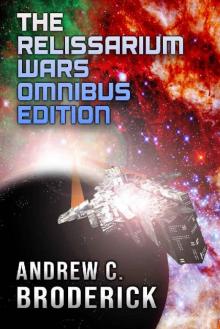 The Relissarium Wars Omnibus
The Relissarium Wars Omnibus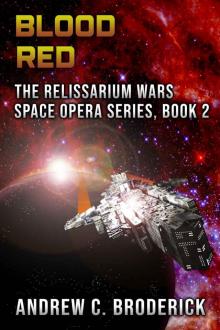 Blood Red: The Relissarium Wars Space Opera Series, Book 2
Blood Red: The Relissarium Wars Space Opera Series, Book 2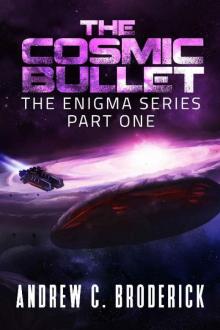 The Cosmic Bullet: The Enigma Series, Part One
The Cosmic Bullet: The Enigma Series, Part One Zara's Flight: Book One of the Kato's War series
Zara's Flight: Book One of the Kato's War series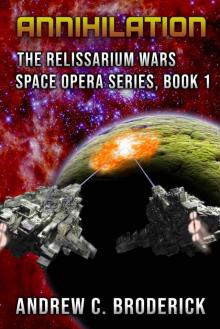 Annihilation: The Relissarium Wars Space Opera Series, Book 1
Annihilation: The Relissarium Wars Space Opera Series, Book 1 Blood Red
Blood Red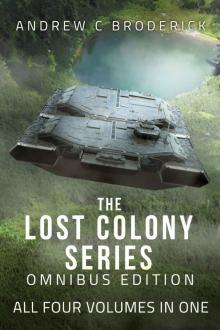 The Lost Colony Series: Omnibus Edition: All Four Volumes in One
The Lost Colony Series: Omnibus Edition: All Four Volumes in One Kato's War: Book Two of the Kato's War series
Kato's War: Book Two of the Kato's War series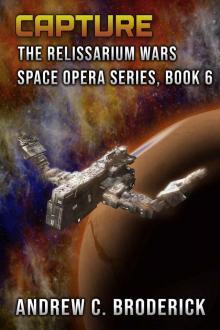 Capture: The Relissarium Wars Space Opera Series, Book 6
Capture: The Relissarium Wars Space Opera Series, Book 6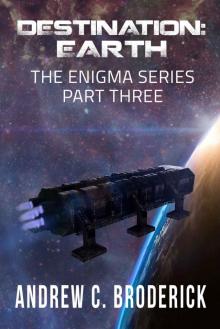 Destination: Earth: The Enigma Series, Part Three
Destination: Earth: The Enigma Series, Part Three Kato's War
Kato's War Broken Angel
Broken Angel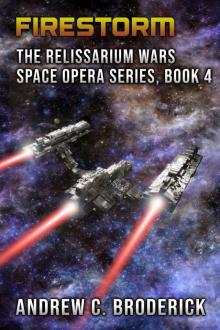 Firestorm: The Relissarium Wars Space Opera Series, Book 4
Firestorm: The Relissarium Wars Space Opera Series, Book 4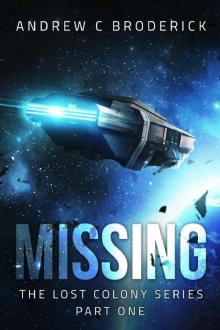 Missing: The Lost Colony Series, Part One
Missing: The Lost Colony Series, Part One